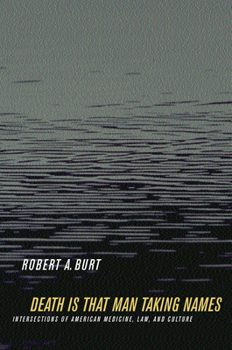Death Is That Man Taking Names: Intersections of American Medicine, Law, and Culture
(Part of the California/Milbank Books on Health and the Public Series)
Select Format
Select Condition 
Book Overview
The American culture of death changed radically in the 1970s. For terminal illnesses, hidden decisions by physicians were rejected in favor of rational self-control by patients asserting their "right to die"-initially by refusing medical treatment and more recently by physician-assisted suicide. This new claim rested on two seemingly irrefutable propositions: first, that death can be a positive good for individuals whose suffering has become intolerable; and second, that death is an inevitable and therefore morally neutral biological event. Death Is That Man Taking Names suggests, however, that a contrary attitude persists in our culture-that death is inherently evil, not just in practical but also in moral terms. The new ethos of rational self-control cannot refute but can only unsuccessfully try to suppress this contrary attitude. The inevitable failure of this suppressive effort provokes ambivalence and clouds rational judgment in many people's minds and paradoxically leads to inflictions of terrible suffering on terminally ill people.
Judicial reforms in the 1970s of abortion and capital punishment were driven by similarly high valuations of rationality and public decision-making-rejecting physician control over abortion in favor of individual self-control by pregnant women and subjecting unsupervised jury decisions for capital punishment to supposed rationally guided supervision by judges. These reforms also attempt to suppress persistently ambivalent attitudes toward death, and are therefore prone to inflicting unjustified suffering on pregnant women and death-sentenced prisoners.
In this profound and subtle account of psychological and social forces underlying American cultural attitudes toward death, Robert A. Burt maintains that unacknowledged ambivalence is likely to undermine the beneficent goals of post-1970s reforms and harm the very people these changes were intended to help.
Judicial reforms in the 1970s of abortion and capital punishment were driven by similarly high valuations of rationality and public decision-making-rejecting physician control over abortion in favor of individual self-control by pregnant women and subjecting unsupervised jury decisions for capital punishment to supposed rationally guided supervision by judges. These reforms also attempt to suppress persistently ambivalent attitudes toward death, and are therefore prone to inflicting unjustified suffering on pregnant women and death-sentenced prisoners.
In this profound and subtle account of psychological and social forces underlying American cultural attitudes toward death, Robert A. Burt maintains that unacknowledged ambivalence is likely to undermine the beneficent goals of post-1970s reforms and harm the very people these changes were intended to help.
Format:Paperback
Language:English
ISBN:0520243242
ISBN13:9780520243248
Release Date:September 2004
Publisher:University of California Press
Length:221 Pages
Weight:0.70 lbs.
Dimensions:0.6" x 5.8" x 8.7"
Customer Reviews
1 rating
Extremely informative, objective and intelligent
Published by Thriftbooks.com User , 18 years ago
As an ordained minister, I found that I am able to speak on a much higher level, being able to eliminate the typical reactionary responses we are typical of hearing in this country surrounding the ethics of death. Particularly, for me as it relates the the issue of abortion, has the book been a god-send. Burt has systematically outlined the historical attitudes and public mores surrounding abortion by locating the moment the controversies began. Like most things in society at-large, there are competing interests for every aspect of life. Someone always wants to be in control. I will refrain from giving away too much so that you will be as intrigued as I while reading a couple years ago.





